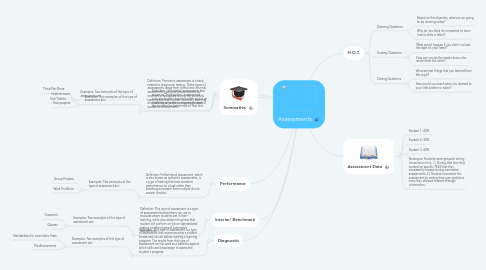
1. Formative
1.1. Definition: Formative assessment is closely related to diagnostic testing. These types of assessments range from formal and informal assessment types and are conducted by teachers or specialists during the student's learning process in order to modify teaching and learning activities to improve student academic achievement.
1.1.1. Examples: Two examples of this type of assessment are:
1.1.1.1. Think-Pair-Share
1.1.1.2. Exit Tickets
2. Interim/ Benchmark
2.1. Definition: This type of assessment is a type of assessment that teachers can use to evaluate where students are in their learning, while also determining how that student will perform on future standardized testing or other types of summative assessments.
2.1.1. Examples: Two examples of this type of assessment are:
2.1.1.1. Classwork
2.1.1.2. Quizzes
3. Summative
3.1. Definition: Summative assessments also known as "high stakes" assessments, evaluate student learning at the end of an instructional unit by comparing it against the standard or benchmark of that unit.
3.1.1. Examples: Two examples of this type of assessment are:
3.1.1.1. midterm exam
3.1.1.2. final projects
4. Performance
4.1. Definition: Performance assessment, which is also known as authentic assessments, is a type of testing that tests students' performance on a task rather than selecting an answer from multiple choice answer choices.
4.1.1. Examples: Two examples of this type of assessment are:
4.1.1.1. Group Projects
4.1.1.2. Work Portfolios
5. Diagnostic
5.1. Definition: This type of assessment is a type of assessment that examines what a student knows and can do before starting a learning program. The results from this type of assessment can be used as a baseline against which skills and knowledge to assess the student's progress.
5.1.1. Examples: Two examples of this type of assessment are:
5.1.1.1. Standardized or summative Tests
5.1.1.2. Pre-Assessments
6. H.O.T.
6.1. Opening Questions
6.1.1. Based on the objective, what are we going to be learning today?
6.1.2. Why do you think it is important to learn how to write a letter?
6.2. Guiding Questions
6.2.1. What would happen if you didn't include the date on your letter?
6.2.2. How can you let the reader know who wrote them the letter?
6.3. Closing Questions
6.3.1. What are two things that you learned from this topic?
6.3.2. How would you teach what you learned to your little brother or sister?

